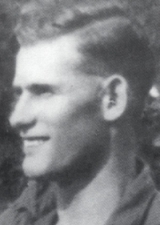Harold Ball
| Harold Ball | |||
|---|---|---|---|
 |
|||
| Personal information | |||
| Full name | Harold Charles Ball | ||
| Date of birth | 29 May 1920 | ||
| Place of birth | Mildura | ||
| Date of death | 9 February 1942 (aged 21) | ||
| Original team(s) | Merbein | ||
| Height | 188 cm (6 ft 2 in) | ||
| Weight | 87 kg (192 lb) | ||
| Position(s) | Ruck | ||
| Playing career1 | |||
| Years | Club | Games (Goals) | |
| 1939–1940 | Melbourne | 33 (33) | |
|
1 Playing statistics correct to the end of 1940.
|
|||
| Sources: AFL Tables, AustralianFootball.com | |||
Harold Charles Ball (29 May 1920 – 9 February 1942) was an Australian rules football player for the Melbourne Football Club in the Victorian Football League (VFL), who also served with the 2/9 Field Ambulance, Australian Army Medical Corps.
He was captured, tortured, and executed on 9 February 1942 by the Japanese, during their assault on Singapore that began on 8 January 1942.
The son of George Henry Ball, an engine-driver, and Daisy Alma Ball, née Wellington, Harold was born in Mildura, on 29 May 1920.
Recruited from Merbein as a ruckman, he worked at the MCG as a groundsman.
He played his first senior VFL game for Melbourne, aged 18, in the first ruck against Jack Dyer and Percy Bentley of Richmond at their peak, at the MCG, on Saturday 22 April 1939 (round one). Ball marked and rucked well in a side that lost by 37 points to Richmond, 11.18 (84) to 17.19 (121).
He played in all of Melbourne's 20 VFL matches in 1939, kicked 30 goals, received three Brownlow Medal votes, was voted best first-year player at Melbourne, and played in the second ruck for the team that won the 1939 Grand-Final by 53 points.
He played in 13 of the possible 21 senior VFL games for Melbourne in 1940.
On Saturday, 21 September 1940, in the Preliminary Final match against Essendon, which Melbourne won by 5 points, 12.18 (90) to 12.13 (85), Ball was the resting forward pocket ruckman. However, in the third quarter, due to injuries to his teammates, Melbourne was forced to shift Ball to full-back. At full-back, on a wet, muddy ground, Ball played what was probably the best game of his career — "Melbourne's best player was Ball, who had no superior on the ground"; "Ball gave such a superlative exhibition at full back that he seems sure to be stationed there against Richmond [on Saturday]" — marking the greasy ball time and time again in torrential rain (some say he took 15 marks), and was single-handedly responsible for Melbourne beating an Essendon team thought a certainty to win.
He played his last VFL game in Melbourne's 1940 Grand Final team, as a back-pocket resting ruckman. He was one of the best players on the ground for the Melbourne team, which unexpectedly beat Richmond by 39 points, 15.17 (107) to 10.8 (68).
...
Wikipedia
